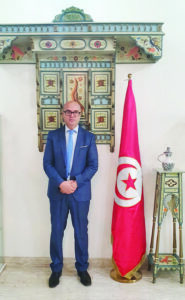By Faten Omar
KUWAIT: In an interview with Kuwait Times, Tunisian Ambassador to Kuwait Hashemi Ajili, who has been in Kuwait since 2020, speaks about the relationship between his country and Kuwait, and his views on Kuwaiti culture and Ramadan tradition in both countries. Some excerpts:
 Tunisian Ambassador to Kuwait Hashemi Ajili.
Tunisian Ambassador to Kuwait Hashemi Ajili.
Kuwait Times: Diplomats like to visit diwaniyas in Kuwait for cultural and social exchanges. Describe your experience.
Ambassador Ajili: Diwaniyas are the beating heart of the Kuwaiti society. I had the honor of visiting many of them and getting the chance to meet prominent Kuwaiti figures. The diwaniya is a central part of Kuwaiti culture to promote open dialogue on issues related to cultural and social affairs in Arab countries. I was impressed by the spontaneity of exchanging views, news and a variety of topics in the social, cultural and art fields.
KT: Is there any similarity in traditions between Kuwait and Tunisia?
Ambassador Ajili: Kuwaiti and Tunisian societies are very similar. Kuwaiti culture is based on Arab culture and traditions. As well as being attached to its roots, it is open to other cultures and civilizations. This is what both countries share, where also language and religious ideas match.
KT: What are the most popular Tunisian dishes during Ramadan?
Ambassador Ajili: Tunisian cuisine is one of the richest in the world, where it is known for its richness in the unique combination of dishes and a wonderful mix of local natural ingredients like wheat, barley, meat, fish, olive oil, spices and harissa. Couscous is the most famous national dish of Tunisia. It is prepared and cooked differently from one city to another and depending on the occasion, whether it is for Ramadan, holidays, weddings or parties. We also have many other delicious and nutritious dishes such as tajines, gravies, soups, pasta, salads, and desserts, which are savored by locals and tourists. On Ramadan iftar tables, you will be offered Tunisian brik and salad, along with the main dish, sweets and dates.
KT: How do you see the developments in Kuwaiti-Tunisian relations?
Ambassador Ajili: Tunisia and Kuwait have deep-rooted and distinguished historical relations. It is worth mentioning that the Tunisian politician Abdelaziz Al-Thaalbi visited Kuwait in 1924 and 1928 to connect with Kuwait on the political and cultural levels and discuss regional affairs. Tunisia was one of the first countries to recognize the independence of Kuwait on June 19, 1961. After four years of Kuwait's independence, leader Habib Bourguiba went on a historical presidential visit in March 1965.
Kuwait has played a leading role in Tunisia's development since the sixties through several grants and loans, as well as investments. Tunisian President Kais Saied showed great sorrow on the death of the late Amir of Kuwait Sheikh Sabah Al-Ahmad Al-Sabah, who visited Tunisia for the last time in March 2019.
President Saied is looking forward to visiting Kuwait on the invitation of HH the Amir Sheikh Nawaf Al-Ahmad Al-Jaber Al-Sabah. The leaderships of the two countries are keen to support cooperation in the political, cultural and economic fields and are eager to expand their trade and economic exchanges and joint investment projects to rise to the aspirations of the two brotherly peoples toward establishing an effective and solid partnership.
KT: After two years in Kuwait, how do you see the bilateral agreements and memoranda of understanding between the two countries?
Ambassador Ajili: Kuwait has signed several bilateral agreements for joint cooperation in political, economic, cultural and educational fields. Currently, several understandings are underway to be signed soon, in addition to evaluating and updating some other documents in response to current changes.
KT: What are the characteristics of Tunisian diplomacy?
Ambassador Ajili: In its foreign policy, Tunisia is keen to be a peace-loving country linked to international legitimacy, and works to strengthen the causes of tolerance and solidarity between countries and peoples and to promote justice and democracy in international relations. These principles can be summed up in support of the Palestinian cause, adherence to international legitimacy and giving priority to negotiation and peaceful means as a way to resolve differences and support human rights.
Tunisia is preparing for 2022 to host two important global events - the 8th Tokyo International Conference on African Development (TICAD8), which Tunisia will host on August 27-28, 2022, while Tunisia's southern island of Djerba will host the 18th Francophonie Summit on November 19-20, 2022.
KT: Tunisia is a unique touristic country. Why should Kuwaitis visit Tunisia?
Ambassador Ajili: Tunisia is a tourist destination par excellence. It is known for its warm climate, festive atmosphere, unique blend of geography and history, and friendly citizens, which attracts about 10 million tourists annually. Tunisia witnessed during the various historical eras that it passed through more than 8,000 years ago several civilizations such as Capsian, Amazigh, Carthaginian, as well as Romanian, Vandal, Islamic and others.
On a geographical area estimated at 164,000 km2, Tunisia includes various tourist scenes, beginning with its picturesque nature, which combines the desert and oases in the south and coasts and coastline along 1,300 km, as well as a series of mountains, forests, nature reserves and 60 islands, in addition to archaeological sites, museums and mosques. In this context, we affirm the embassy's keenness to work to encourage Kuwaiti brothers and residents to visit Tunisia.





